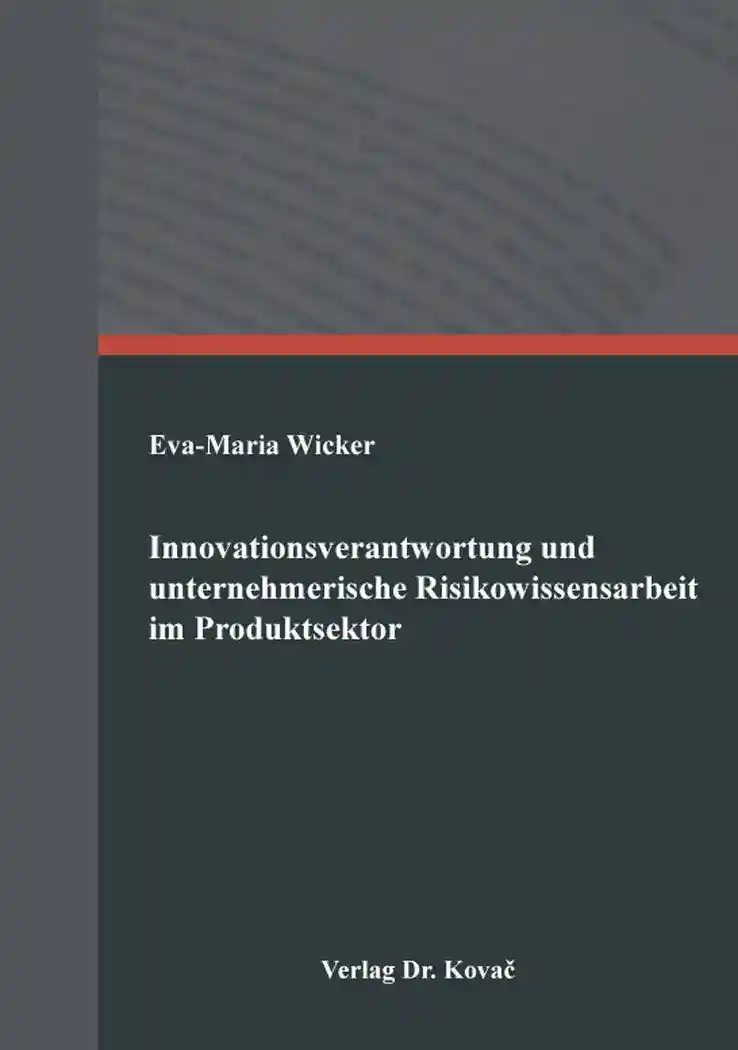Eva-Maria WickerInnovationsverantwortung und unternehmerische Risikowissensarbeit im Produktsektor
Zur rechtlichen Steuerung der Generierung und Verarbeitung von Risiko- und Folgewissen unter gesonderter Berücksichtigung von Modifizierungspotenzialen des Produkthaftungsrechts – dargestellt am Beispiel nanotechnologisch behandelter Verbraucherprodukte
Studien zur Rechtswissenschaft, volume 440
Hamburg 2020, 584 pages
ISBN 978-3-339-11530-0 (print)
ISBN 978-3-339-11531-7 (eBook)
Rezension
[…] Insgesamt liefert sie mit den vorgeschlagenen Änderungen de lege ferenda einen wertvollen Diskussionsbeitrag hinsichtlich des Umgangs mit Nichtwissen und der Ausgestaltung der Verantwortlichkeit handelnder Unternehmer im Produktsektor. Darüber hinaus gibt die Arbeit einen guten Überblick über die bei der unternehmerischen Risikoarbeit zu berücksichtigenden Rechtsgebiete auf europäischer und nationaler Ebene sowie über das notwendige Zusammenwirken der verschiedenen Akteure.
About this book deutschenglish
Technological innovations, such as nanomaterials used in products, present special challenges for law because their usage and possible consequences for human health are largely unclear. With respect to this lack of knowledge, the problem is how to deal with these innovations within the legal framework. In order to ensure shared responsibility among all participants involved in the innovation process, it is paramount to discern any such lack of knowledge about possible risks and their conceivable consequences as well as to create a common understanding about these knowledge gaps. The entrepreneurial users of the product play an important role in detecting and eliminating risks because they are the first to deal with the actual products.
The thesis starts by dealing with the significance and relevance of risk knowledge work as an illustration of the innovation-specific responsibility of authorities and of the entrepreneurial participants who are involved in the innovation process. The importance of these entrepreneurial participants is the focal point of the thesis. While following the general control mechanisms of generating knowledge, this thesis also takes uncertainties and ignorance into consideration as well as epistemic and behavioral economics and addresses the ensuing challenges for an innovation appropriate design of entrepreneurial risk knowledge work.
Applying specific instruments of product and substance law, additionally voluntary measures, this thesis explores whether and to what extent risk knowledge work of the participants is embedded in the current judicial framework. Moreover, the question whether the already identified specificities of uncertainties and ignorance have been normatively taken into account are considered. Based on identified deficits in the regulation of entrepreneurial risk knowledge work of the selected legal instruments, possible scopes for improvements in the design of product liability law are examined. In a further step, considerations concerning possible modifications of the product liability regime follow. These considerations result in a proposal for a more knowledge-driven legal policy of European product liability law.
